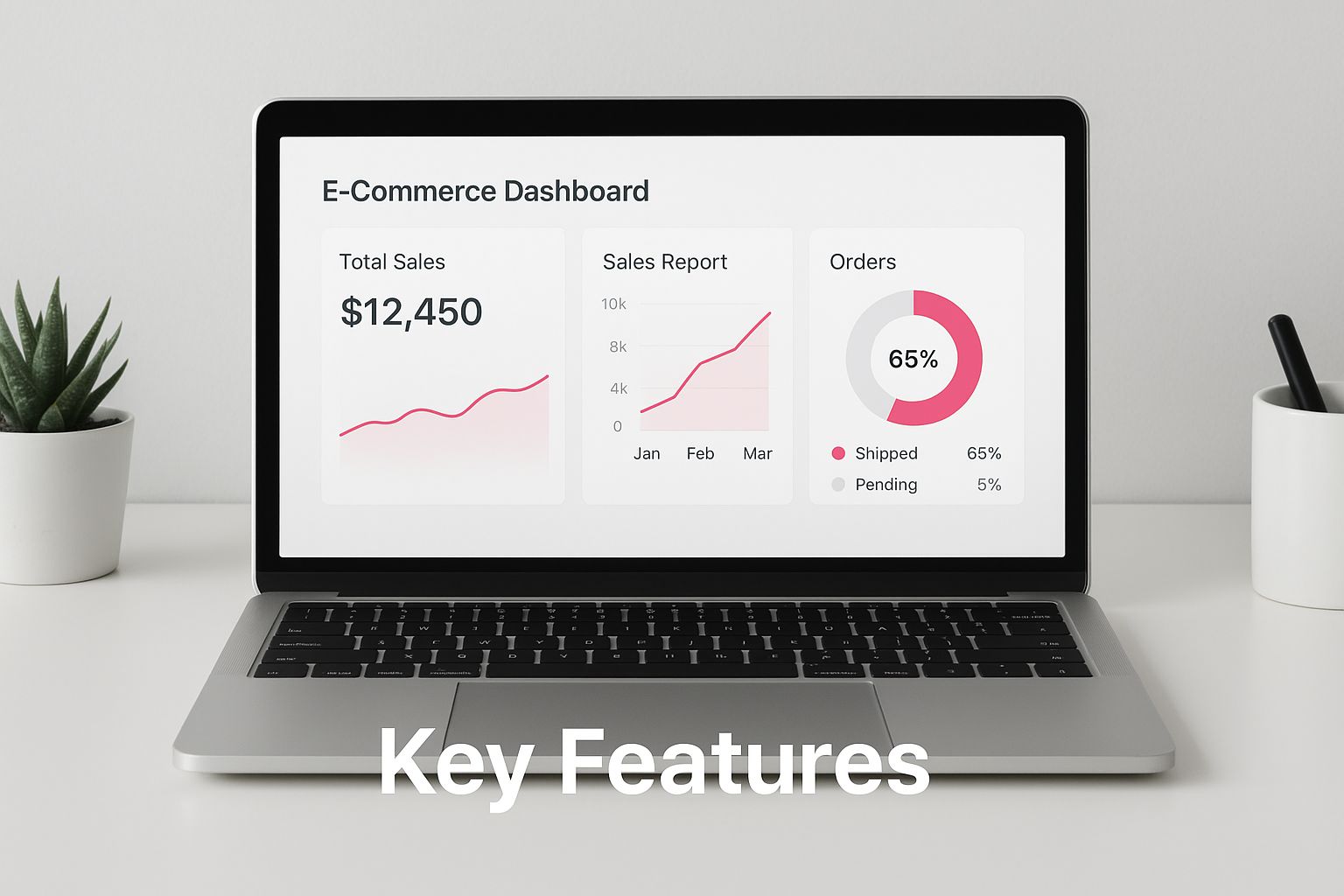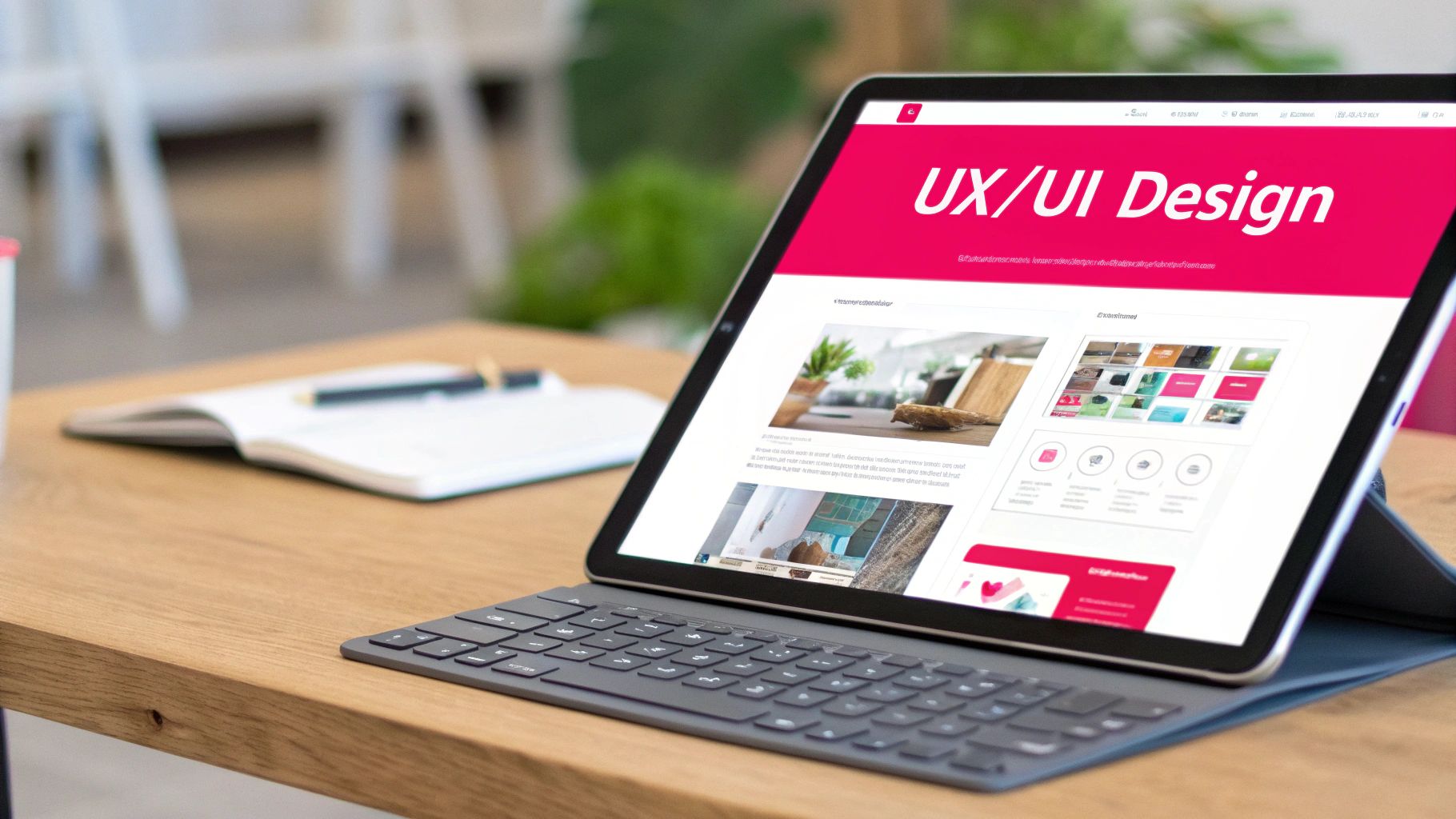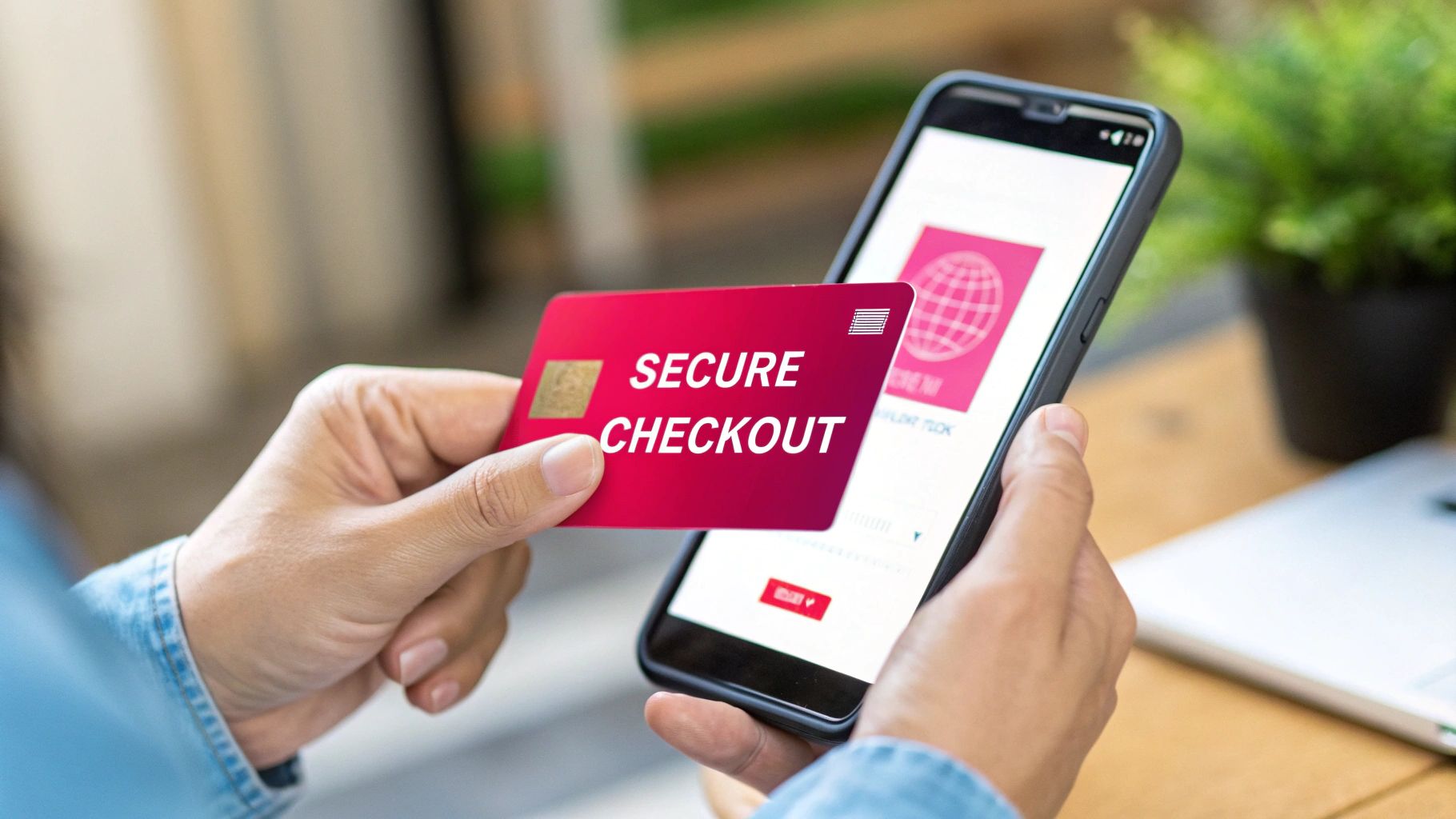Dubai is a goldmine for ecommerce, but you can't just show up and expect to strike it rich. This isn't about simply throwing up an online store; it's about plugging into a unique, fast-paced digital economy. What makes it so special? Think high internet penetration, a population that lives on their phones, and a government that's actively pushing for digital growth.
Why Dubai Is Your Next Big Ecommerce Play
Entering Dubai’s ecommerce market puts your brand right in the heart of one of the world's most exciting commercial hubs. The customers here are not just online; they are digital natives. They have significant disposable income and a real hunger for online shopping, buying everything from high-end luxury fashion to their weekly groceries. It’s a perfect storm for brands ready to make their mark.
The numbers speak for themselves. The UAE's e-commerce market was valued at around USD 11.01 billion in 2023. Even more impressively, it's projected to explode to USD 23.62 billion by 2032. That’s a compound annual growth rate of roughly 11.52%. This isn't just growth; it's a massive opportunity waiting to be seized.
Getting to Know the Dubai Shopper
Dubai is a melting pot, with a vibrant mix of expatriates from all over the world and local Emiratis. This multicultural landscape directly shapes what people buy and how they buy it. If you want your ecommerce business to succeed, you have to build your website with these local nuances in mind from day one.
So, what are Dubai shoppers really like?
- They're mobile-first, always. The vast majority of online shopping here happens on a smartphone. A mobile-friendly website isn't a "nice-to-have"—it's the absolute baseline for entry.
- Service expectations are sky-high. Customers here expect lightning-fast delivery, a checkout process that’s over in a few clicks, and instant customer service, often directly through WhatsApp.
- Localisation builds trust. Shoppers are far more likely to buy from a site that lists prices in AED, offers familiar payment methods like Cash on Delivery (COD), and has a straightforward local returns policy.
You Need a Smart Entry Strategy
A one-size-fits-all website just won’t work here. Breaking into the Dubai market successfully demands a solid plan built on a real understanding of the local scene. As you map out your move into Dubai, having a well-defined international market entry strategy is non-negotiable. This goes way beyond simple translation; it’s about full-scale localisation.
The most successful ecommerce businesses in Dubai are built on two pillars: deep cultural understanding and flawless operations. The goal is to create a shopping experience that feels local, secure, and incredibly convenient.
This means you need to think local at every step. Curate your product selection for local tastes, craft marketing campaigns that resonate with cultural events like Ramadan or Eid, and partner with regional delivery companies that people know and trust. Every single detail contributes to your success. In the sections that follow, we'll break down the practical steps you need to take to build a business that truly connects with this lucrative market.
Getting Your Dubai Ecommerce Licence Sorted
Before you even think about product photos or website design, let's talk about the single most important step in building your Dubai ecommerce empire: getting the legal paperwork right. It can seem like a maze of regulations, but tackling this first saves you a world of headaches and potential fines down the road.
Your business model is the compass that guides this decision. For most startups, it comes down to a choice between setting up on the Dubai mainland or in one of the specialised free zones. Each path has its own set of rules, costs, and benefits, so it’s crucial to understand which one fits your vision.
Mainland vs. Free Zone: The Big Decision
Think of a mainland licence, often called a DED licence from the Department of Economy and Tourism (DET), as your all-access pass to the UAE market. If your game plan is to sell directly to customers anywhere in Dubai and across the other emirates, this is your ticket. It gives you the ultimate freedom to trade without restriction.
On the other hand, a free zone licence is a powerhouse for international trade. Zones like Dubai Commercity are specifically built for ecommerce and offer some tempting perks: 100% foreign ownership, zero personal or corporate income tax, and much simpler import/export rules. This is a brilliant option if you're using Dubai as a launchpad to serve the wider region or the world.
The most common pitfall I see is entrepreneurs picking a licence that fights against their sales strategy. A free zone setup is incredible for global shipping, but if you're laser-focused on selling directly to local shoppers across the UAE, a mainland licence often makes more sense.
To really get to grips with this, let's put them side-by-side.
Dubai Ecommerce License Comparison
Choosing between a mainland and a free zone licence really comes down to your primary market and operational style. This table breaks down the essential differences to help you see which path aligns better with your business goals.
| Feature | Mainland (DED Trader) | Free Zone (e.g., Dubai Commercity) |
|---|---|---|
| Market Access | Unrestricted access to the entire UAE market. | Perfect for international sales; local UAE sales often need a third-party distributor. |
| Ownership | 100% foreign ownership is now the standard for most business activities. | 100% foreign ownership is a core, guaranteed benefit. |
| Office Space | A physical office space is usually mandatory. | Flexible options are the norm, including virtual offices and co-working desks. |
| Customs Duty | Standard customs duties apply to all imported goods. | Duty exemptions are common for goods brought in for re-export. |
| Setup Process | Can be more involved, sometimes requiring a Local Service Agent. | Generally a faster, more streamlined setup designed for international investors. |
Ultimately, the right choice depends on whether your focus is local dominance or global reach. The structure you choose today will shape your business's future.

The Paperwork Trail
Once you've picked your lane—mainland or free zone—it's time to gather your documents. The authorities are meticulous, so getting your paperwork in order from the start is non-negotiable. They need a crystal-clear picture of your business to grant the right approvals.
You’ll almost always need to have these ready:
- A completed application form from the DET or your chosen free zone authority.
- Clear passport copies for every shareholder and the business's manager.
- A concise business plan outlining what you sell, who you sell to, and how you operate.
- Proof of your trade name reservation, confirming your business name is approved and available.
Here’s a pro tip: be incredibly specific when selecting your business activity code. If you sell handmade cosmetics, don't just choose a generic "trading" activity. A precise code prevents compliance issues and makes everything smoother as you grow.
Budgeting for Your Launch
Getting licensed isn't a single expense; it's a collection of fees you need to plan for. The total cost can swing quite a bit depending on your setup.
Make sure you budget for:
- Trade Name Reservation: A small fee to lock in your business name.
- Initial Approval Fee: A charge for the authorities to review and greenlight your business concept.
- Licence Fee: This is the main cost and varies by jurisdiction and the activities you're approved for.
- Office Rent: Even a virtual office has an annual fee, which is often mandatory.
- Visa Fees: Costs associated with residency visas for yourself or any staff.
Beyond the initial setup, you have to stay on the right side of the law. The UAE's Consumer Protection Law is serious about transparency. This means clear pricing, fair return policies, and quality products are a must. Likewise, data privacy rules dictate how you handle customer information, so a rock-solid privacy policy on your website isn't just good practice—it's a legal requirement.
Choosing Your Ecommerce Platform for the UAE

Picking your ecommerce platform is one of the most critical decisions you'll make. Think of it as the foundation of your digital storefront. It dictates everything from how you manage inventory day-to-day to whether your site can handle the intense traffic of a White Friday sale without crashing. This isn't just about choosing a nice-looking template; it’s about choosing a partner for your long-term growth.
For anyone diving into ecommerce website development in Dubai, the options can feel overwhelming. But when you look closer, a few clear frontrunners have proven their mettle in the UAE's unique commercial landscape. Let's break down the big three: Shopify, Magento (now Adobe Commerce), and WooCommerce.
Each of these platforms has its own personality, with distinct strengths and weaknesses. The trick is to align the platform’s core features with your specific business model, your team’s technical skills, and where you see your business heading in the next few years.
Shopify: The User-Friendly Powerhouse
Shopify is the undisputed champion for startups and small to medium-sized businesses, and for very good reason. Its biggest draw is its sheer simplicity and how quickly you can get to market. It's entirely possible to have a slick, professional, and fully functional store up and running in a surprisingly short amount of time, often without needing to touch a single line of code.
As an all-in-one hosted solution, Shopify takes care of the technical headaches. Server maintenance, security patches, performance optimisation—it's all handled for you. This frees you up to concentrate on what actually grows your business: sourcing great products and selling them.
Here’s why Shopify works so well for a Dubai-based store:
- Ease of Use: The admin panel is famously intuitive. Adding products, processing orders, and checking your sales figures feels natural, even for complete beginners.
- App Ecosystem: The Shopify App Store is a treasure trove. You can find ready-made apps to integrate with local couriers like Aramex, add WhatsApp chat for customer support, or set up a loyalty programme tailored to the region.
- Rock-Solid Reliability: When a high-stakes event like the Dubai Shopping Festival hits, you need your site to stay online. You can count on Shopify's infrastructure to remain stable and fast.
Of course, this simplicity has its trade-offs. While you can customise a lot with themes and apps, you don't get the same deep-level control over the source code as you would with other platforms. You also need to be mindful of transaction fees, which can add up on top of your monthly subscription if you’re not using Shopify Payments.
Magento (Adobe Commerce): The Scalable Giant
For larger, more established businesses with complex operational needs, Magento (now part of Adobe Commerce) is the go-to. This is an open-source beast, celebrated for its incredible flexibility, scalability, and an exhaustive list of built-in features. If your vision includes thousands of SKUs, multiple storefronts for different GCC countries, or highly bespoke functionality, Magento is engineered to handle it.
All that power comes with a bigger price tag, both in terms of money and time. You will absolutely need a skilled team of developers to build, launch, and maintain a Magento store. It's a significant investment. But for the enterprises that require it, the granular control it provides is second to none.
Magento is like being handed the keys to a Formula 1 car. It can do amazing things, but you need a professional driver at the wheel. For businesses with the resources, it offers the ultimate command over every single detail of their ecommerce operation.
Where Magento really shines in the UAE context:
- Unmatched Customisation: If you can dream it, you can probably build it. You can tailor the user experience precisely to what Dubai shoppers expect.
- Multi-Store Functionality: It’s brilliant at managing different brands, languages (with flawless Arabic right-to-left support), and currencies, all from one central dashboard.
- Robust Performance: When a Magento site is properly optimised, it can handle enormous product catalogues and huge surges in traffic without even breaking a sweat.
WooCommerce: The Flexible WordPress Plugin
WooCommerce strikes a fantastic balance. It isn't a standalone platform but a free, open-source plugin that cleverly transforms any WordPress website into a full-fledged ecommerce store. This makes it the perfect choice for businesses that are already using WordPress or those who lean heavily on content marketing and SEO to drive sales.
By tapping into the vast WordPress ecosystem, you get access to thousands of themes and plugins. This allows for a huge degree of customisation without the sheer complexity of a platform like Magento. You retain full ownership of all your data and have complete control over your store's look, feel, and functionality.
The UAE's digital retail scene is booming, home to over 36,000 online stores. With apparel making up the largest slice of the market at 17.7%, the ability to stand out is crucial. Platforms like WooCommerce, which can be heavily customised, are invaluable in such a crowded field. You can find more data about the UAE's thriving ecommerce landscape on Aftership.com.
The flip side of choosing WooCommerce is that you're in charge of your own hosting, security, and maintenance. While this gives you ultimate control, it also adds a layer of technical responsibility that a platform like Shopify would handle for you. The success of your ecommerce website development in Dubai using WooCommerce really hinges on the quality of your hosting provider and your team's ability to manage the site effectively.
Ultimately, the "best" platform is the one that fits your budget, your technical capabilities, and your vision for growth in Dubai's dynamic market.
Designing an Experience for Dubai Shoppers

To make a real impact in Dubai, your website needs to do more than just display products. It has to connect with the local audience on every level, from its functionality to its cultural feel. A generic, one-size-fits-all template just won't cut it here; you need to design an experience that feels intuitive, trustworthy, and built specifically for shoppers in the region.
The absolute starting point for any successful e-commerce site in Dubai is a mobile-first design. This isn't just a suggestion—it's a requirement. Smartphone use in the UAE is sky-high, and a huge chunk of online shopping happens on mobile devices. Your site has to look great and work flawlessly on a small screen.
Mastering the Bilingual Interface
A massive portion of your customers will be bilingual, easily flipping between Arabic and English. Offering a seamless experience in both languages is a huge sign of respect and instantly widens your audience. But this is far more complex than just plugging in a translation tool.
Sure, adding a language toggle is simple. The real craft is in handling Arabic's right-to-left (RTL) script. When someone switches to Arabic, your entire site layout needs to intelligently mirror itself.
- Navigation menus have to jump from the left to the right side of the screen.
- Product images and their accompanying descriptions should swap places.
- Directional icons, like arrows for sliders or "next" buttons, must be reversed.
Getting these details wrong creates a confusing and unprofessional look that can destroy a shopper's confidence in your brand. Proper RTL design is a specialised skill that blends technical know-how with a keen eye for aesthetics.
Building Trust with Local Shoppers
Shoppers in Dubai are discerning and hold high standards for security and service. Because of this, your website's design needs to actively build trust from the moment they land on your homepage all the way through checkout. Visual cues are your best friend here, signalling that your business is legitimate and reliable.
To really connect, look into e-commerce personalization tools and strategies that can make your store feel more tailored to each visitor. This kind of attention to detail shows you understand your customers' individual needs.
In the Dubai market, trust isn't a given—it has to be earned with every visual and functional element on your site. Shoppers are actively looking for signals that prove a business is local, secure, and responsive before they'll even think about buying.
Make sure you display these trust signals clearly, especially on product pages and in the shopping cart:
- Security Seals: Logos from well-known providers like McAfee or Norton.
- Payment Logos: Familiar icons for Visa, Mastercard, and popular local payment options.
- Clear Policies: Easy-to-find links for your shipping and returns information.
Integrating Culturally Relevant Communication
How you talk to your customers is just as crucial as your site's layout. In the UAE, people often prefer more immediate and direct forms of communication. While email support is necessary, it’s rarely the go-to for a quick question.
This is where WhatsApp integration becomes a game-changer. Adding a simple WhatsApp chat button gives customers a direct line to you through an app they already use every day. It’s the perfect way to answer questions before a sale, give order updates, or handle issues instantly. This small addition can do wonders for your conversion rates by making you seem more accessible and helpful.
Finally, think about your imagery. Use high-quality photos and videos that reflect the local culture—not by using stereotypes, but by featuring models, locations, and styles that feel both familiar and aspirational to your Dubai audience. From top to bottom, your site should feel like it was made for them, not just translated for them. Our team truly understands the subtleties of effective ecommerce website designing in Dubai and can help you build an experience that genuinely resonates. By zeroing in on these localised UI and UX details, you’ll stop being just another online store and start becoming a trusted local brand.
Integrating Local Payment and Shipping Solutions
So, you've got a fantastic product and a beautiful website. Now comes the moment of truth: the checkout. This is where countless sales are won or lost in Dubai. A clunky payment process or a vague shipping policy can send a confident buyer running for the hills.
Getting the operational side right is every bit as crucial as your storefront's design. Your success in ecommerce website development in Dubai really comes down to offering payment and shipping options that people here know, trust, and prefer. It's less about just plugging in a system and more about understanding the local mindset.
Choosing the Right UAE Payment Gateways
The UAE's payment scene is a unique blend of global powerhouses and strong local champions. Simply adding a standard credit card form just doesn't cut it anymore. You need to give customers a choice of secure, familiar options.
Here are the top players you should definitely be looking at:
- Stripe: A global favourite for a reason. It's known for its slick interface and developer-friendly setup. Stripe handles AED payments perfectly and is a great fit if you're aiming for a modern, seamless checkout feel.
- Telr: A true homegrown hero. Telr has deep roots in the region and offers fantastic support for local payment methods. Many businesses focused purely on the Middle East see it as the go-to, reliable choice.
- PayTabs: Another regional powerhouse with a robust set of features, including invoicing and solid fraud protection. It integrates well with all major e-commerce platforms, making it a popular option across the GCC.
When you're weighing them up, don't just get fixated on transaction fees. Think about the bigger picture. How easy is it to integrate with your platform? What's their customer support like when you run into an issue? And critically, how quickly does your money land in your business bank account?
Don't Underestimate Cash on Delivery and BNPL
Digital payments are soaring, but Cash on Delivery (COD) is still king for a huge segment of the market. For many shoppers, it's about trust and security—they want to see and touch the product before parting with their cash. If you decide to skip COD, you're potentially shutting the door on a massive group of customers.
Of course, COD comes with its own headaches. It demands tight coordination with your courier, a clear process for handling returns, and careful cash flow management. The solution is partnering with a delivery service that has a proven, reliable system for collecting cash and getting it back to you promptly.
The real game-changer in recent years has been the explosion of 'Buy Now, Pay Later' (BNPL) services. Platforms like Tabby and Tamara have become household names, letting customers split payments into interest-free instalments. Adding a BNPL option can seriously boost your conversion rates, especially for more expensive items.
Streamlining Your Logistics and Shipping
Your delivery promise is a huge part of your brand's reputation. In a city like Dubai, where expectations for speed and service are sky-high, a slow or unreliable courier can do lasting damage.
Picking the right logistics partner is one of the most important decisions you'll make. You need a company that not only delivers on time but also plugs neatly into your e-commerce platform to automate things like order fulfilment and customer tracking.
Here’s a quick rundown of some top couriers in the region:
| Courier | Key Strengths | Best For |
|---|---|---|
| Aramex | Extensive network, reliable service, and strong brand recognition across the Middle East. | Businesses of all sizes looking for a trusted, all-around delivery partner. |
| Fetchr | Innovative tech-driven approach using GPS for deliveries, ideal for a mobile-native audience. | Startups and modern brands wanting to offer a flexible and user-friendly delivery experience. |
| Local Couriers | Companies like Shyft and Jeebly offer competitive pricing and specialised services like same-day delivery. | Businesses needing hyper-local, rapid delivery solutions within specific areas of Dubai. |
The UAE's e-commerce market is a massive economic driver, valued at USD 8.8 billion as of 2024 and projected to hit USD 13.8 billion by 2029. A flawless delivery experience is non-negotiable if you want to claim your piece of that pie. You can find more data about the MENA ecommerce market on Digital Commerce 360.
Ultimately, building the right operational stack is all about having a deep understanding of local habits. By pairing trusted payment gateways with fast, reliable delivery partners, you create a smooth, frictionless journey that turns browsers into loyal customers. For a deeper dive, see how a great ecommerce website design in the UAE can tie this all together.
Frequently Asked Questions
When you're diving into ecommerce in Dubai, a lot of the same questions tend to pop up. It's totally normal. Getting these sorted early on is key to building an online store that actually succeeds in this market. Let's walk through some of the most common queries we get from entrepreneurs.
One of the first things everyone wants to know is how long it all takes. A simple Shopify store, using a pre-built theme with a few tweaks, can be up and running in a surprisingly short time—often just 2-4 weeks.
But if you’re looking at something more substantial, say a custom-built site on a platform like Magento with unique features and specific integrations, you need to be more patient. A project like that usually takes anywhere from 3-6 months to get from the drawing board to launch day.
What Is the Average Cost
The budget question is always a big one, and the honest answer is: it depends. The cost to develop an ecommerce website in Dubai can swing wildly depending on what you need. A straightforward, template-based site on Shopify or WooCommerce will typically land somewhere between AED 10,000 to AED 25,000.
If your vision includes a custom-designed storefront with special integrations for local payment gateways and couriers, you should plan for a budget in the range of AED 30,000 to AED 70,000+. For large-scale, enterprise-level builds on platforms like Adobe Commerce, the investment can easily go much higher, driven by the depth of custom work involved.
Think of your website as a long-term investment in your business, not just a line item expense. Getting the platform and design right from the start pays dividends through better conversions, happier customers, and more efficient operations.
Do I Need a Physical Office
This is a classic point of confusion for new business owners in the UAE, and the answer hinges on the type of trade licence you have.
- Mainland (DED) Licence: If you go this route, having a physical office address is pretty much a non-negotiable requirement.
- Free Zone Licence: Here, you have more flexibility. Many free zones, such as Dubai Commercity, provide options like virtual offices or co-working memberships that tick the legal boxes without the overhead of a dedicated physical lease.
Making the right choice on your legal setup at the beginning is critical, as it has a direct ripple effect on your ongoing operational needs and costs.
Ready to build an ecommerce store that captivates the Dubai market and drives real results? Grassroots Creative Agency specialises in crafting high-performance websites that blend stunning design with powerful functionality. Start your project with us today and let's build your online success story.








